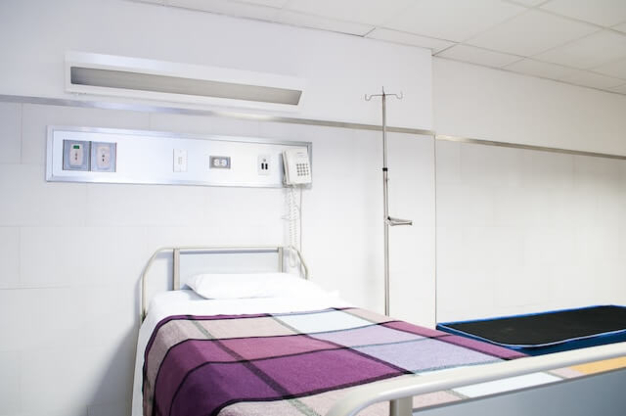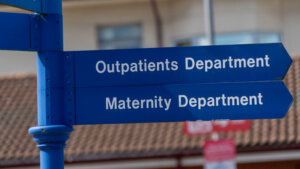Private Healthcare Negligence

Contact
Table of Contents
Can you claim medical negligence against a private hospital?
Yes – it can be a little more complicated than bringing a claim against an NHS hospital. This post will explain key differences in bringing a claim against a private healthcare provider, the process involved, and how to make a complaint against a private healthcare provider.
With the ever-increasing wait times for NHS treatment, more and more people are choosing to use private healthcare providers. The number of people paying for private healthcare is at an all-time high amid frustration at NHS waiting times.
People often expect more from private healthcare providers – you pay for a better service. However, when the standard of care falls below what you are entitled to, you may be left questioning whether you can claim compensation against the private healthcare provider.
What is medical negligence in private hospitals?
This is medical negligence in a private healthcare setting, i.e. a healthcare provider not run by the state. Examples of private healthcare providers in the UK include BUPA, AXA Health, Ramsay Health Care and Nuffield Health.
As with NHS hospitals, you can bring a claim for medical negligence for a range of reasons, including, for example, misdiagnosis, delayed/incorrect treatment, surgical error, and birth injuries. This is not an exhaustive list.
To be eligible for compensation, you need to be able to prove two things:
- The care you received fell below the medically accepted standards.
Healthcare professionals owe a duty of care to their patients. You can only claim compensation for injuries and associated financial losses if you can show that the hospital was ‘negligent’; and that this caused loss or damage to you. Negligence means making a mistake which would not have been made by any reasonably competent professional in the relevant field. If some reasonably competent professional would have done the same thing, the claim will fail.
- The negligence directly caused injury to you or caused an existing condition to worsen.
You must then show that the alleged medical negligence, more likely than not, caused or, at the very least, materially contributed to the injuries and any reasonably foreseeable losses. Causation is difficult to establish in medical negligence cases where many factors interplay.
The basic test for causation can be summarised as: “But for the negligence, the patient would not, on the balance of probabilities, have suffered harm in any event.”
What are the differences between private and NHS hospital negligence claims?
The main difference is who you are bringing a claim against. Trusts run NHS hospitals and clinics. The NHS Trust must ensure that all treatments and care do not fall below the medically accepted standards. With private healthcare providers, the situation can be more complex. When clinical errors occur by a consultant at the hospital, e.g., a private surgeon or another practitioner, the liability sits with them as an individual.
You, therefore, bring a claim against the individual professional who has provided the treatment/care. As a result, it is not uncommon for there to be multiple defendants when a private healthcare provider is sued for medical negligence. In contrast, NHS claims often focus on the Trust as the sole defendant. This can be further complicated as private healthcare professionals often keep their own records separate from the hospital you were treated in.
With private healthcare negligence claims, it can also be tricky to determine the individual or organisation you are bringing a claim against. This is because the healthcare workers may not be employees of the hospital. If they weren’t, they would be covered by their insurance company, and your claim will need to be directed at them rather than the hospital you were treated in.
Furthermore, you may have signed a contract with a private healthcare provider. The contract may indicate what a successful outcome would look like following your specific procedure. If this has not been achieved, you may be able to pursue a case on a contractual basis.
That said, informed consent can be a more frequent issue in private healthcare claims. If a procedure is being “sold” to you, the risks and side effects may have been brushed over to make the sale. If you are unaware of all the possible outcomes/risks, you may not have informed consent for the procedure.
How do you make a complaint against a private healthcare provider?
If you feel you received sub-standard care from a private healthcare provider, you may want to make a formal complaint. You can complain directly to the provider, as most should have their own complaints procedure.
Some private healthcare providers, including some NHS Trust Private Patient Units (private units within NHS hospitals), are represented by the Independent Sector Complaints Adjudication Service (ISCAS). They have a Complaints Code of Practice, which includes a service to resolve disputes between yourself and the private healthcare provider.
You can also complain to the Care Quality Commission (CQC). This independent body inspects and regulates NHS, private health, and adult social care in England.
How do you claim against a private healthcare provider?
The claims process is similar whether you claim medical negligence against the NHS or a private healthcare provider.
Our website contains useful information and frequently asked questions you might have in bringing a claim.
How can we help?
Do you think you may have a negligence claim against a private hospital? Contact us today for expert legal advice and start your claim.
- Fill in our online enquiry form; or
- Call us on 020 7485 8811
Share this article
“Small but very effective and experienced team so every client benefits from the personal touch but also highly skilled litigation know-how. Capability of the team means they can handle all aspects of very complex cases as well as straightforward matters.”
“Osbornes Law is an established firm which handles a breadth of complex and high-value clinical negligence matters.”
Make a claim for Private Healthcare Negligence
Call us 020 7485 8811
Email us Send us an email and we’ll get back to you
Related InsightsVIEW ALL
- 10.7.2025
Osbornes Law Secures £700K in Crohn’s Negligence...
Negligent delay in diagnosing Crohn’s disease leads to £700K settlement Jodi Newton, Partner, was instructed in a case against...
Read more - 13.5.2025
Damages Recovered for Necrotic Pressure Sore
Elline Demetriou recovers damages following a necrotic pressure sore on her client’s heel Elline Demetriou, Solicitor in our clinical...
Read more - 12.5.2025
Complaints Against Suspended Surgeon Ms Kuldeep Stohr
Ms Kuldeep Stohr, orthopaedic surgeon at Addenbrooke’s Hospital suspended In February 2025, Cambridge University Hospitals NHS Foundation Trust (CUH) confirmed...
Read more - 6.5.2025
Six-Figure Settlement for Negligent C-Section Delivery
Osbornes secures a six-figure settlement following a negligent caesarean section delivery Jodi Newton, Partner and head of our Obstetric and...
Read more - 6.5.2025
Six-Figure Settlement for Negligent Shoulder Surgery
Settlement following a claim against Bedfordshire Hospitals NHS Foundation Trust Elline Demetriou, a Solicitor in our clinical negligence team, acted...
Read more - 29.4.2025
Five-Figure Settlement in Fatal Medical Negligence Case
Osbornes Law secures a five-figure compensation following a fatal medical negligence claim Osbornes acted for our client, E, who brought...
Read more - 4.4.2025
Time To Move On From Physician Associates?
BMA raises concerns over patient safety: the risks of Physician and Anaesthesia Associates in the NHS The British Medical Association (...
Read more - 13.3.2025
Addenbrooke’s Hospital Complaints
Review finds harm to children by surgeon at Addenbrooke’s Hospital An independent review by Cambridge University Hospitals NHS Foundation...
Read more - 4.2.2025
Claim Settled for Child’s Surgery Injuries
Osbornes secures settlement for child’s surgery-related injuries Osbornes Law successfully represented a minor, X, in a claim against two...
Read more - 29.1.2025
£27,000 DVT Claim Settled Against Royal Free London NHS
Successful settlement for DVT case against Royal Free London NHS Foundation Trust Successful Settlement of £27,000.00 for DVT Claim against Royal...
Read more - 14.10.2024
Multi-Million Settlement in Cerebral Palsy Negligence Case
Judge awards multi-million settlement in cerebral palsy medical negligence claim Jodi Newton, Partner and specialist medical negligence lawyer at Osbornes...
Read more - 19.9.2024
Report highlights failings in maternity care
The Care Quality Commission (CQC) has recently carried out a national review of 131 maternity inspections between 2022 and 2024, finding that failures...
Read more - 12.9.2024
Great Ormond Street Hospital Negligence & How to Claim
Review of negligence at Great Ormond Street Hospital At Osbornes Law, we’ve supported families through some of the most...
Read more - 29.8.2024
AB v Central London Community Healthcare NHS Trust
Background Our client, AB, had been using the Nexplanon contraceptive device for 6 years. She had a Nexplanon device inserted into...
Read more - 30.7.2024
What Is the Role Of a Physician Associate?
What does the Position of Physician Associate Mean for the NHS? There are many different jobs within the NHS, each...
Read more - 17.7.2024
Settlement for Delay in Wrist Fracture Treatment
Our Clinical Negligence team have recently agreed the settlement of a case relating to a delay in the treatment of...
Read more - 28.6.2024
£55,000 Settlement for Stillbirth Claim Against Chelsea and Westminster...
Successful Settlement for Stillbirth Claim Against Chelsea and Westminster Hospital NHS Foundation Trust Background Nick Leahy, an Associate in our...
Read more - 9.5.2024
Claim Against Royal Free London NHS Foundation Trust...
Client obtains settlement after being victim of a surgical negligence Jodi Newton, Partner in our Clinical Negligence department, recently settled...
Read more - 30.4.2024
Settlement In Neonatal Death Case
Settlement in fatal medical negligence case against King’s College Hospital Nick Leahy, Associate in our Clinical Negligence department, recently...
Read more - 8.4.2024
Epilepsy Negligence Compensation Claim
Nicholas Leahy, an Associate in the Clinical Negligence team at Osbornes Law, has recently settled a long-running fatal medical negligence...
Read more - 11.1.2024
New UK Supreme Court Ruling regarding Secondary Victims...
The Supreme Court has today, on the 11th January 2024, upheld the Court of Appeal’s order to dismiss the claims...
Read more - 11.1.2024
Secondary Victim Claims
Secondary victims in clinical negligence cases What is a secondary victim in clinical negligence cases? Most compensation claims are concerned...
Read more - 5.1.2024
Delayed Pre-Eclampsia Diagnosis Results in Loss of Baby
Introduction to the case Nick Leahy, Associate in our Clinical Negligence department, has recently settled a birth injury claim against...
Read more - 12.12.2023
NHS Compensation Payouts Guide
What Are NHS Compensation Payouts? In the UK, the National Health Service delivers the vast majority of healthcare services. When...
Read more


























